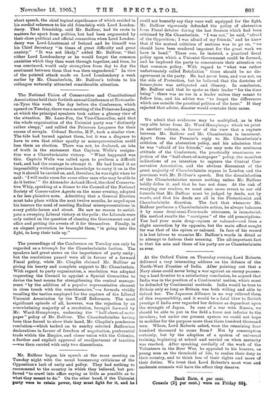We admit that evidences may be multiplied, as in the
very able letter from Mr. Ward-Humphreys which we print in another column, in favour of the view that a rupture between Mr. Balfour and Mr. Chamberlain is imminent. Apart from the Premier's reply to Mr. Chamberlain's criticism of the abstention policy, and his admission that he was "afraid of his friends," one may note the mutinous attitude of the Conference, the practically unanimous re- jection of the " half-sheet-of-notepaper " policy, the manifeat indications of an intention to capture the Central Con- servative Association, and the obvious discontent of the great majority of Chamberlainite organs in London and the provinces with Mr. Balfour's speech. But the dissatisfaction of the Chamberlainites means nothing unless Mr. Balfour boldly defies it, and that he has not done. At the risk of wearying our readers, we must once more revert to our old formula that Mr. Balfour must be judged by deeds, not by words, and that his deeds are all in the Protectionist and Chamberlainite direction. The fact that whenever Mr. Balfour performs a Chamberlainite action, he always balances it by some detni-semi-Free-trade utterance, is immaterial. His method recalls the " corrigens " of the old prescriptions. You had your main drug—opium or calomel—and then a slight correction by its opposite, but the main effect sought for was that of the opium or calomel. In face of his record it is lost labour to examine Mr. Balfour's words in detail or to attempt to fathom their meaning. The all-important fact is that his acts and those of his party are as Chamberlainite as ever.


































































 Previous page
Previous page